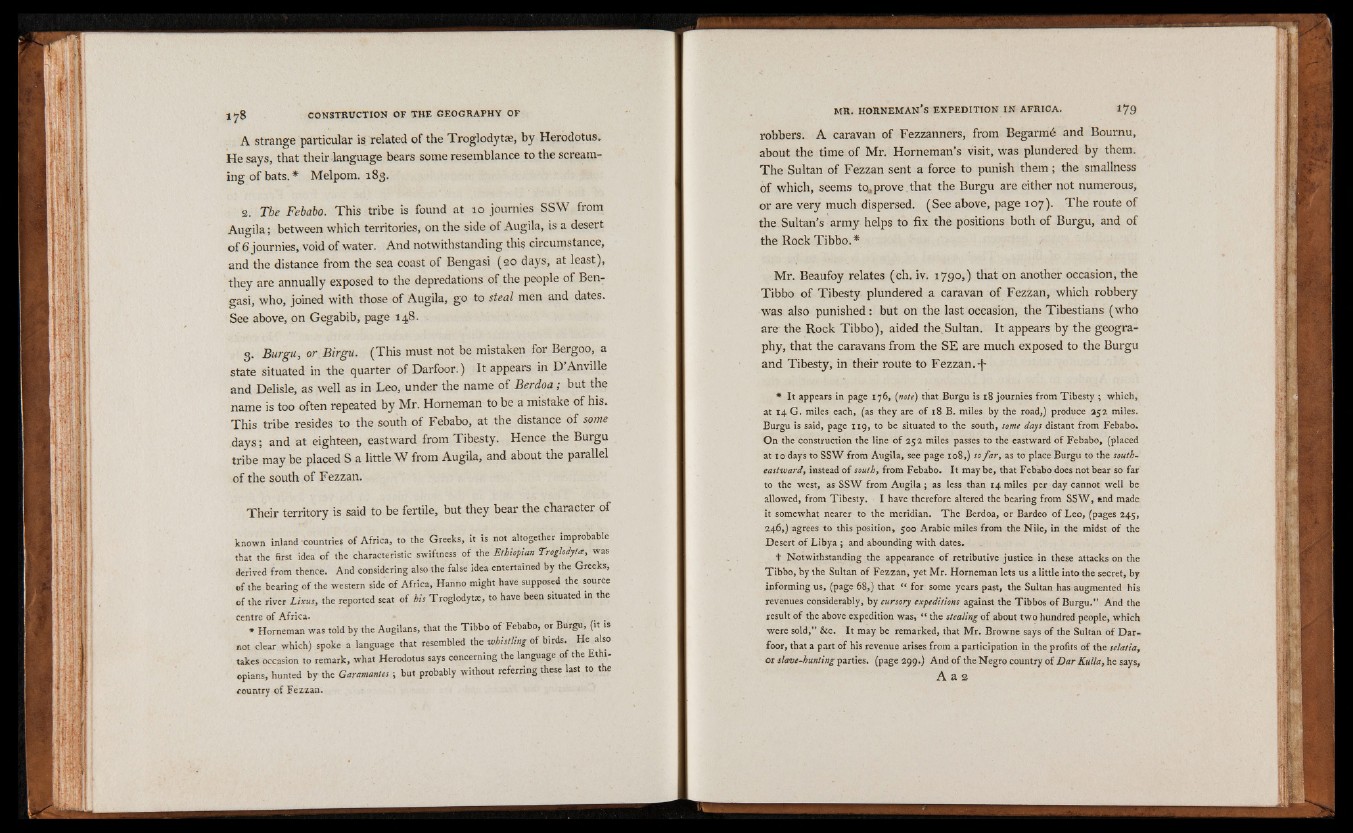
A strange particular is related of the Troglodytae, by Herodotus.
He says, that their language bears some resemblance to the screaming
of bats.* Melpom. 183.
2. The Febabo. This tribe is found at 10 journies SSW from
Augila; between which territories, on the side of Augila, is a desert
of 6 journies, void of water. And notwithstanding this circumstance,
and the distance from the sea coast of Bengasi (20 days, at least),
they are annually exposed to the depredations of the people of Bengasi,
who, joined with those of Augila, go to steal men and dates.
See above, on Gegabib, page 148.
3. Burgu, or Birgu. (This must not be mistaken for Bergoo, a
state situated in the quarter of Darfoor.) It appears in D Anville
and Delisle, as well as in Leo, under the name of Berdoa; but the
name is too often repeated by Mr. Horneman to be a mistake of his.
This tribe resides to the south of Febabo, at the distance of some
days; and at eighteen, eastward from Tibesty. Hence the Burgu
tribe may be placed S a little W from Augila, and about the parallel
of the south of Fezzan.
Their territory is said to be fertile, but they bear the character of
known inland-countries of Africa, to the Greeks, it is not altogether improbable
that the first idea of the characteristic swiftness of the Ethiopian Troglodyte, was
derived from thence. And considering also the false idea entertained by the Greeks,
of the bearing o f the western side of Africa, Hanno might have supposed the source
of the river Lixus, the reported seat of his Troglodyte, to have been situated in the
centre of A frica. * . .
* Horneman was told by the Augilans, that the Tibbo of Febabo, or Burgu, (it is
not clear which) spoke a language that resembled the whistling of birds. He also
takes occasion to remark, what Herodotus says concerning the language of the Ethiopians,
hunted b y the Garamantes ; but probably without referring these last to the
country of Fezzan.
robbers. A caravan of Fezzanners, from Begarmi and Bournu,
about the time of Mr. Horneman’s visit, was plundered by them.
The Sultan of Fezzan sent a force to punish them; the smallness
of which, seems to„prove.that the Burgu are either not numerous,
or are very much dispersed. (See above, page 107). The route of
the Sultan’s army helps to fix the positions both of Burgu, and of
the Rock Tibbo.*
Mr. Beaufoy relates (ch. iv. 1790,) that on another occasion, the
Tibbo of Tibesty plundered a caravan of Fezzan, which robbery
was also punished : but on the last occasion, the Tibestians (who
are the Rock Tibbo), aided the,Sultan. It appears by the geography,
that the caravans from the SE are much exposed to the Burgu
and Tibesty, in their route to Fezzan.-f
* It appears in page 176, (note) that Burgu is 18 journies from Tibesty ; which,
at 14 G . miles each, (as they are of 18 B. miles by the road,) produce 252 miles.
Burgu is said, page 119, to be situated to the south, some days distant from Febabo.
On the construction the lipe of 252 miles passes to the eastward of Febabo, (placed
at 10 days to SSW from Augila, see page 108,) so fa r , as to place Burgu to the southeastward,
instead o f south, from Febabo. It may be, that Febabo does not bear so far
to the west, as SSW from A u g ila ; as less than 14 miles per day cannot well be
allowed, from Tibesty. I have therefore altered the bearing from S SW , and made
it somewhat nearer to the meridian. T h e Berdoa, or Bardeo of Leo, (pages 245,
246,) agrees to this position, 500 Arabic miles from the Nile, in the midst o f the
Desert o f Libya ; and abounding with dates.
t Notwithstanding the appearance of retributive justice in these attacks on the
Tibbo, by the Sultan of Fezzan, yet Mr. Horneman lets us a little into the secret, by
informing us, (page 68,) that “ for some years past, the Sultan has augmented his
revenues considerably, by cursory expeditions against the Tibbos o f Burgu.” And the
result of the above expedition was, “ the stealing of about two hundred people, which
were sold,” &c. It may be remarked, that Mr. Browne says of the Sultan of Darfoor,
that a part of his revenue arises from a participation in the profits o f the selatia,
or slave-hunting parties, (page 299.) And o f the Negro country o f Dar Kulla, he says,
A a 2